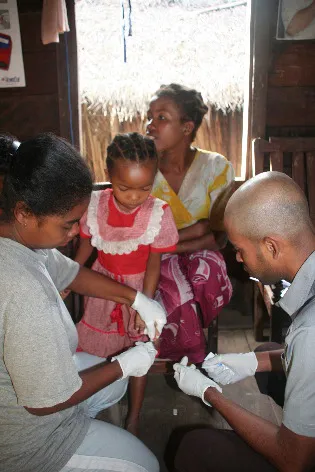Gund Director, Taylor Ricketts, is co-author of “Human Health Impacts of Ecosystem Alteration,” published in the Proceedings of the National Academy of Sciences.
The paper stems from the Health & Ecosystems: Analysis of Linkages consortium and delineates a new branch of environmental health that focuses on the public health risks of human-caused changes to Earth’s natural systems.
Looking comprehensively at available research to date, the paper’s authors identified repeated correlations between changes in natural systems and existing and potential human health outcomes, including:
· Forest fires used to clear land in Indonesia generate airborne particulates that are linked to cardiopulmonary disease in downwind population centers like Singapore.
· Risk of human exposure to Chagas disease in Panama and the Brazilian Amazon, and to Lyme disease in the United States, is positively correlated with reduced mammalian diversity.
· When households in rural Madagascar are unable to harvest wild meat for consumption, their children can experience a 30% higher risk of iron deficiency anemia—a condition that increases the risk for sickness and death from infectious disease, and reduces IQ and the lifelong capacity for physical activity.
· In Belize, nutrient enrichment from agricultural runoff hundreds of miles upstream causes a change in the vegetation pattern of lowland wetlands that favors more efficient malaria vectors, leading to increased malaria exposure among coastal populations.
· Human health impacts of anthropogenic climate change include exposure to heat stress, air pollution, infectious disease, respiratory allergens, and natural hazards as well as increased water scarcity, food insecurity and population displacement.
In their paper, the authors demonstrate the far reaching effects of this little explored and increasingly critical focus on ecological change and public health by illustrating what is known, identifying gaps for and limitations of future research efforts, addressing the scale of the health burden associated with changes to natural systems, and proposing a research framework that strengthens the scientific underpinnings of both public health and environmental conservation. Such efforts should lead to a more robust understanding of the human health impacts of accelerating environmental change and inform decision-making in the land-use planning, conservation, and public health policy realms. They also point out the equity and inter-generational justice issues related to this field, as most of the burdens associated with increased degradation of natural systems will be experienced by the poor and by future generations.
Dr. Steven Osofsky, who oversees the HEAL consortium and leads the Wildlife Conservation Society’s Health programs around the world said, “Not all governments prioritize environmental stewardship, and many lack adequate resources to support public health. If we can combine forces and utilize sound science to build inter-sectoral bridges where conservation and public health interests are demonstrated to coincide, it's a win-win. On the other hand, if we don’t work together to understand the global burden of disease that’s associated with alterations in the structure and function of natural systems, well, we may find ourselves testing planetary boundaries in ways that are frightening and difficult to reverse.”
The paper, “Human Health Impacts of Ecosystem Alteration,” appears on November 12th in the Proceedings of the National Academy of Sciences, Early Edition. Authors include Samuel S. Myers of the Harvard University School of Public Health; Lynne Gaffikin of Evaluation and Research Technologies for Health Inc.; Christopher D. Golden of the Harvard University Center for the Environment; Richard S. Ostfeld of the Cary Institute of Ecosystem Studies; Taylor H. Ricketts of the University of Vermont’s Gund Institute for Ecological Economics; Will R. Turner of Conservation International; and Kent H. Redford and Steven A. Osofsky of the Wildlife Conservation Society.
For more information, please contact Scott Smith at 718-220-3698
Acknowledgements:
This work was supported by The Rockefeller Foundation and The Gordon and Betty Moore Foundation as part of the Health & Ecosystems: Analysis of Linkages (HEAL) program. Support was also received from the Bill & Melinda Gates Foundation. Any opinions expressed herein are those of the authors and do not necessarily reflect those of the program's supporters.
